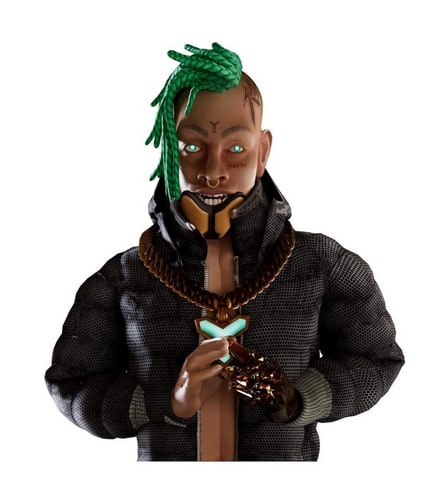 Capitol Records
Capitol Records
You'd be forgiven for having never heard of FN Meka before this week, now we're dealing with the fallout from the cynical low-point of the "A.I. rapper" debate. As previously reported, the animated character was dropped by Capitol Records after social media users flagged an old song using the n-word and imagery depicting Meka as the victim of police brutality.
On Thursday Anthony Martini, who co-founded the Factory New, the company behind Meka, alongside Brandon Le, released a statement today confirming his decision to leave FN and any involvement with the character moving forward.
Martini said in his statement that Factory New was founded after FN Meka had released some early singles, including the offending track featuring a racial slur. “It’s become apparent that I should have done more diligence before joining,” he said. “I take responsibility for diving into a project without comprehensively examining its history.”
Billboard reports Martini is a former artist manager who was CEO of Royalty Exchange from 2021 until earlier this year and was involved in the early careers of Lil Dicky and MadeinTYO. He was also vocalist in rap-metal group E.Town Concrete.
Martini also addressed Kyle the Hooligan, the Houston rapper who told Vice he provided all of the vocals on FN Meka's music before alleging that he has was cut out without payment prior to Factory New signing the Capitol Records deal. This contradicts claims made by the company in 2021 that FN Meka's lyrics and vocals were A.I. generated. Kyle said Martini and Le "used my voice, used my sound, used the culture, and literally just left me high-and-dry. I didn’t get a dime off of nothing, and they got record deals."
Responding to this in his own statement, Martini said "Kyle the Hooligan’s experience with Meka is deeply at odds with my core values. I believe that artists must always be at the center of the creative process and must be compensated fairly."
Upon announcing FN Meka had singed to Capitol, the rapper shared "Florida Water" featuring Gunna. Kyle The Hooligan has said he was not the vocalist on that track, though the identity of who did rap on it remains unknown. In an email to Pitchfork, Martini would not reveal the name but stated "I can confirm he is not white."
The FADER has reached out to Factory New for further information. Martini's statement can be read in full below.
After much consideration, I have decided to sever ties with FN Meka and Factory New effective immediately.
I joined the team in early 2020 because I am truly passionate about the future of digital media and felt my background could help fulfill Meka's potential in the music industry. It’s become apparent that I should have done more diligence before joining. In the past few days, I’ve learned of Kyle the Hooligan’s experience with Meka which is deeply at odds with my core values. I believe that artists must always be at the center of the creative process and must be compensated fairly.
I debated making a statement at all, but felt there is some basic info that should be available to clarify the record: I did not create FN Meka, nor did I ever claim to. I discovered Meka online almost a year after "Moonwalkin" and "Internet" were released on Soundcloud and after the police brutality Instagram post was already made. I joined the team in early 2020 and was named co-founder with my specific focus being business development and artist management. I take responsibility for diving into a project without comprehensively examining its history.
As a manager, my role has always been to create opportunities while the artists on our team lead creative. I’ll always defer to the talent when it comes to how they choose to express themselves and will back them in their vision. I can’t speak for what happened before me, but while I was involved, artists on the project were always compensated fairly and participated in the revenue from their work.
I also take full responsibility for the lack of transparency and confusion that my comments about “A.I.” elements in Meka’s music may have caused. Those quotes werefrom a 2021 interview and were meant to create intrigue and provide cover for songs at the time which weren’t ready for scrutiny. FN Meka’s vocals have always been written and performed by humans, which in this case, have been black voices – to be clear.
There are many lessons to be learned from this experience and I believe we have opened important conversations about entertainment in the digital age, the music industry, the metaverse, and what art in general looks like in the future.
Too many artists never realize their dreams because of the labels put on them by society. The music industry is full of talented singers, rappers and producers who never get a shot because a corporation doesn’t think they have “right look” or are “too old” or not “marketable enough”. Whether it's prejudices they face or simply the artist not feeling comfortable with the body they were born in, virtual characters have the potential to be a true equalizer and the next frontier in representation in the arts.
That is how virtual avatars can and should enable MORE artists to have a platform, not fewer. Throughout my career, whether as an artist manager, a label head, or an executive, I’ve been consistent in my mission to empower creatives and providealternatives to unscrupulous norms in the music business. I will continue to do that. — Anthony Martini

